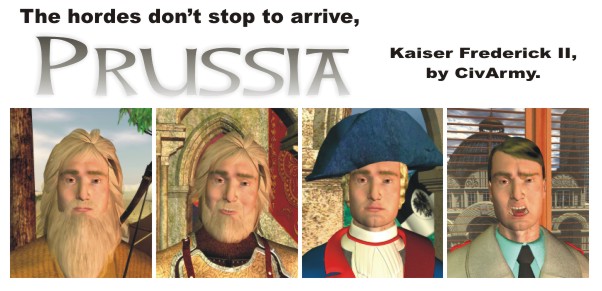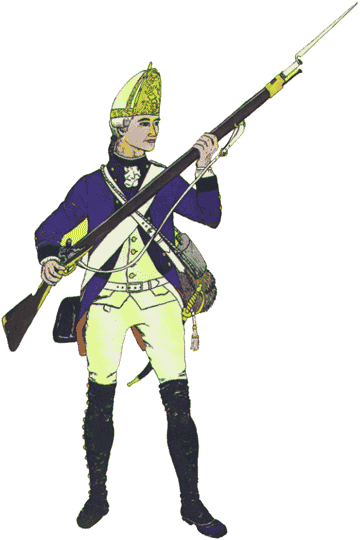CivArmy s. 1994
Deity
Civilization: Prussia
Bonuses: Militaristic and Industrious
Title and leader: Kaiser Frederick II
Best/shunned government: Monarchy and Fascism (Despotism)
Aggression: 05 (too high)
Cultural group: European
Noun: Prussians
Adjective: Prussian
Colors: Black (Zulu) and Grey (Indians)
UU: Hessian Mercenary
Civilopedia entry: RACE_PRUSSIA

Cities:
Königsberg
Potsdam
Brandenburg
Berlin
Konigsberg
Frankfurt
Cologne
Hannover
Bonn
Dortmund
Magdeburg
Torun
Gumbinnen
Goldap
Osterode
Kreuzburg
Insterburg
Feste Friedrich III
Friedland
Gross Karpowen
Gross Warningken
Gross Tromnau
Hohenstein
Lotzen
Memel
Nemmersdorf
Neukirch
Preussisch Eylau
Preussisch Holland
Almenhausen
Allenburg
Allenstein
Liebstadt
Rastenburg
Tilsit
Stalluponen
Gross Friedrichberg
Gross Leistenau
Danziger Haupt
Deutsch Krone
Ebensee
Elbing
Feste Konig Wilhelm I
Hammerstein
Gross Wittenberg
Lobau
Mariensee
Neustadt
Preussisch Stargard
Gross Lunau
Thorn
Marienwerder
Military leaders:
von Blucher
Gneisenau
von Scharnhorst
von Bülow
Kleist
Scientific ones:
Max Planck
Heinrich Hertz
Johannes Kepler
Hans Geiger
Fritz Haber
Civilopedia:
I found it in Firaxis Napoleon Europe scenario
^The rise of Prussia as a European power during the 18th century took many by surprise. Under the noble
statesmanship of the Great Elector Frederick William, and military headsman Frederick the Great, Prussia
expanded its holdings to include not only Berlin and a province east of Danzig, but Silesia which it wrested
from Austria; Pomerania from the Swedes; and a choice strip of land from the Poles that connected East Prussia
to Brandenburg. They also acquired Cleves-Geldres of the lower Rhine, Emden, Mark, and two duchies in southern
Germany. Yet, despite these territorial gains, Prussia remained a relatively poor nation, whose resources were primarily dedicated to the betterment of its army.
^
^ During the French Revolution, Prussia tried to remain noncommittal. But by 1806, having lost much of its
territories to a relentless Napoleon and his unwavering Imperial Guard, Prussia entered the Fourth Coalition
and never looked back. Some badly needed military reforms helped bolster its power, and in 1815, the new
Prussian army (under the enigmatic leadership of Gebhard von Blucher) helped the British bring a final
end to Napoleons reign.
Hessian Mercenary, the UU:
Replaces Musketman, has two extra defensive points and cost 10 shields more.
Bonuses: Militaristic and Industrious
Title and leader: Kaiser Frederick II
Best/shunned government: Monarchy and Fascism (Despotism)
Aggression: 05 (too high)
Cultural group: European
Noun: Prussians
Adjective: Prussian
Colors: Black (Zulu) and Grey (Indians)
UU: Hessian Mercenary
Civilopedia entry: RACE_PRUSSIA

Cities:
Königsberg
Potsdam
Brandenburg
Berlin
Konigsberg
Frankfurt
Cologne
Hannover
Bonn
Dortmund
Magdeburg
Torun
Gumbinnen
Goldap
Osterode
Kreuzburg
Insterburg
Feste Friedrich III
Friedland
Gross Karpowen
Gross Warningken
Gross Tromnau
Hohenstein
Lotzen
Memel
Nemmersdorf
Neukirch
Preussisch Eylau
Preussisch Holland
Almenhausen
Allenburg
Allenstein
Liebstadt
Rastenburg
Tilsit
Stalluponen
Gross Friedrichberg
Gross Leistenau
Danziger Haupt
Deutsch Krone
Ebensee
Elbing
Feste Konig Wilhelm I
Hammerstein
Gross Wittenberg
Lobau
Mariensee
Neustadt
Preussisch Stargard
Gross Lunau
Thorn
Marienwerder
Military leaders:
von Blucher
Gneisenau
von Scharnhorst
von Bülow
Kleist
Scientific ones:
Max Planck
Heinrich Hertz
Johannes Kepler
Hans Geiger
Fritz Haber
Civilopedia:
I found it in Firaxis Napoleon Europe scenario
^The rise of Prussia as a European power during the 18th century took many by surprise. Under the noble
statesmanship of the Great Elector Frederick William, and military headsman Frederick the Great, Prussia
expanded its holdings to include not only Berlin and a province east of Danzig, but Silesia which it wrested
from Austria; Pomerania from the Swedes; and a choice strip of land from the Poles that connected East Prussia
to Brandenburg. They also acquired Cleves-Geldres of the lower Rhine, Emden, Mark, and two duchies in southern
Germany. Yet, despite these territorial gains, Prussia remained a relatively poor nation, whose resources were primarily dedicated to the betterment of its army.
^
^ During the French Revolution, Prussia tried to remain noncommittal. But by 1806, having lost much of its
territories to a relentless Napoleon and his unwavering Imperial Guard, Prussia entered the Fourth Coalition
and never looked back. Some badly needed military reforms helped bolster its power, and in 1815, the new
Prussian army (under the enigmatic leadership of Gebhard von Blucher) helped the British bring a final
end to Napoleons reign.
Hessian Mercenary, the UU:
Replaces Musketman, has two extra defensive points and cost 10 shields more.



 if someone has another suggestion or support Teutonic Knight or Hessian Merc, please, post
if someone has another suggestion or support Teutonic Knight or Hessian Merc, please, post 


 I continue trying. For the other eras I think it is good how they r now.
I continue trying. For the other eras I think it is good how they r now.

 .
.
